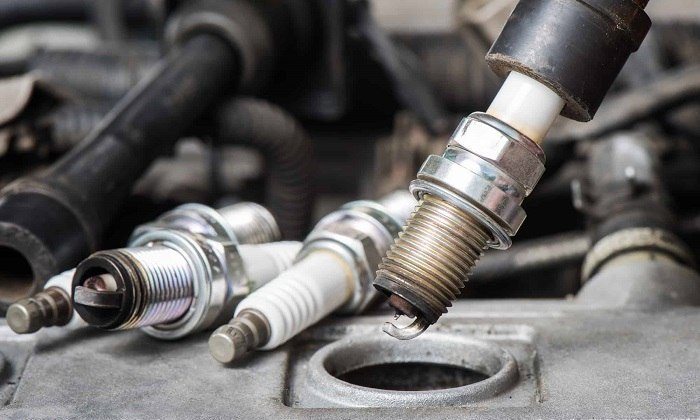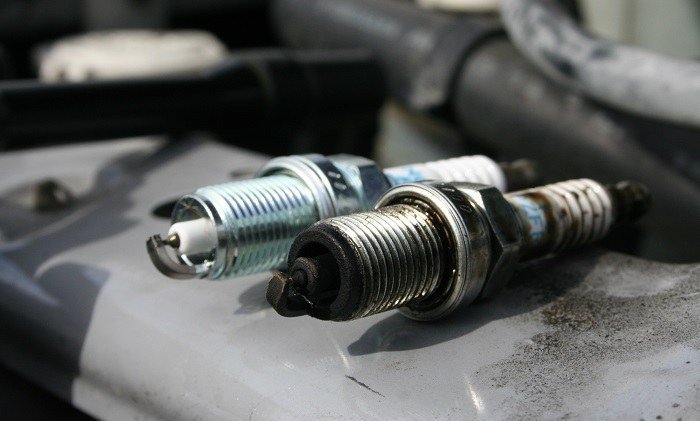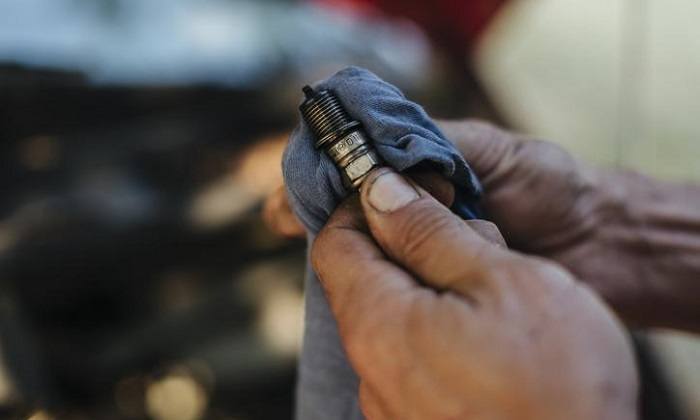by Joshua Thomas
Oil plays some important roles in the vehicle's engine from cooling it down to lubricating the metal parts. But as important as oil might be, there are certain places where it is not meant to be such as the spark plugs.
When you notice that there is oil on your spark plugs, this means there is a problem that needs to be addressed before it leads to other more serious or even catastrophic engine problems.
Different things can result in oil on your spark plugs. Hence, to prevent or be able to deal with the problem, you need to know these causes. Here we explain the most common causes and also provide the symptoms to watch out for and step by step directions for solving the problem.
Contents

Spark plugs play a crucial role in the vehicle's combustion system, and because the combustion chamber is sealed, only the air and fuel mixture should be in contact with your spark plugs. While oil should not be there, here are some common causes of ending up with oil on the spark plugs.
O-ring seals can be found at the bottom of the spark plug well, and one of their main functions is to keep oil away from the spark plugs.
If the O-ring seal is damaged, worn out or just not working properly, it can allow some oil to leak through the valves and end up on your spark plugs. The leaky O-ring often also results in an engine misfire, and if not repaired can lead to costly engine issues.
Motorists need to check these seals often as they are one of the most common failure points, and hence one of the leading causes of oil on spark plugs.
Besides the spark plugs, the valve cover gasket is the other component that is often installed on the cylinder head.
The valve cover gaskets are meant to confine the engine oil to the cylinder head, and hence away from other engine components like spark plugs that do not need to use oil to operate smoothly.
Given the high operating temperatures in the engine, the valve cover gasket wears out and gets damaged over time. What this means is that it will not be able to keep oil out of other engine components, and so some of it can end up leaking to your spark plugs.
Valve guides regulate the air intake into the combustion chamber by ensuring the valves are always in the right place when the engine is running.
When the valve guides wear out or start leaking, they will make the spark plugs more prone to ending up with oil on them as they will allow the oil to leak through.
Spark plugs will be typically located between the intake and exhaust valves in most modern vehicles. And so if the oil can leak through the valves, it is hard for some of it not to end up on the spark plugs.
A blown head gasket is a more serious problem than what many motorists tend to assume, and besides also allowing oil to sip to the spark plugs, it can also cause many other engine issues.
The head gasket helps form the top of the combustion chamber by sealing the cylinder head to the engine block. Hence, when the head gasket is blown, oil can easily enter the combustion chamber.
Because issues with the head gasket can sometimes cost thousands of dollars to fix, it is vital to make sure that you identify the issue early enough as it will be cheaper to repair.
A broken or cracked piston is another common cause of ending up with oil on your spark plugs. As the piston heats up during its normal operation, sometimes the heat can become too much and hence leading to cracks.
The cracks on the piston can provide space for the oil to leak through and into the combustion chamber, which means it will often also end up on the spark plugs.
You can easily tell when you have a broken piston by watching out for things like engine misfire, rattling noise as the car is running and significant power loss.
A broken piston has the potential to cause permanent vehicle damage if you do not replace it immediately. Also, the more you wait, the more you will end up having to pay to resolve the piston problem.
Besides a cracked piston, damage to the compression rings will also result in oil on your spark plugs as the engine oil can leak through.
Compression rings will be at both the top and bottom of the engine, and they are what will prevent the engine oil from leaking into the combustion chamber.
These rings are also tasked with getting rid of the extra oil from the cylinder walls to ensure there will not be any extra oil that can find its way into the combustion chamber.
When the compression rings fail or get damaged, there will be nothing stopping the oil from sipping through the pistons and into the combustion chamber where some of it ends up on the spark plugs.

Even if you know what causes the oil on spark plug issue, you still need to be able to diagnose the problem as soon as possible. Identifying the issue early makes fixing it cheaper and quicker. Here are a few symptoms to watch out for to identify the problem.
Engine backfire will typically happen when there is no combustion in the cylinder, which can be a result of different things such as spark plugs failing to ignite.
Hence, when you find that your engine is misfiring, this can be a sign that your spark plugs are not working well, and they probably have oil on them.
But, because different things can cause spark plug failure, you should combine this symptom with others on our list to be certain that oil is what is causing the spark plugs to malfunction.
When you have an issue with any component in your engine, you can expect to get a decreased overall performance and hesitancy.
When the spark plugs are not working well, the engine tends to misbehave and its performance takes a hit no matter the driving conditions.
Like with most other engine problems, faulty spark plugs will also mean that your vehicle ends up using up more fuel than usual, and hence the fuel economy reduces significantly.
A small factor like oil in spark plugs is still significant enough to change the fuel economy significantly as the vehicle is not able to burn the fuel efficiently.
Blue smoke coming from your exhaust pipe is often an indication that oil is being burnt somewhere in the engine. And so this is also a good sign that you may have some oil on your spark plugs.
When oil leaks to the tip of the spark plug, it will get burnt along with the air and fuel mixture, which then produces the blue smoke on your exhaust.
If you encounter a mixture of gas and oil coming from the tailpipe and accompanied by a peculiar gas smell that can sometimes be felt inside the vehicle's cabinet, then you most likely have oil on your spark plugs.
6. Engine Backfiring
Besides the engine misfiring, oil on your spark plugs can also cause it to backfire. Backfiring will occur because the oil in the spark plugs means the fuel particles are not combusted effectively and hence enter the exhaust system with high energy, which is manifested in the form of small explosions.

The other important thing that you need to know when it comes to the oil on spark plugs issue is how to fix the problem or correct the situation. And this is also a fairly easy process for both beginners and experienced motorists. Below we highlight the simple steps to follow.
The first step when fixing the oil on the spark plugs problem is to switch off the ignition and then disconnect the battery terminals to cut off any power supply.
Once the battery terminals are disconnected, the next step is to remove the valve cover, and here you can easily pry it open with a screwdriver.
With valve cover out of the way, you should now remove the tubes and spark plugs. Doing this exposes all the gaskets and seals that might be damaged and hence require some repairs or replacement.
Next, you need to clean up the valve cover and head before you can install new seals and gaskets. Cleaning helps to remove traces of the old ones to ensure the news ones form a tight seal.
For the cleanup, you should use plastic tools to ensure you do not damage the valve cover or cylinder head. And also use the appropriate greaser.
With the head and cover cleaned up, the next step is to install a new gasket and O-ring seal. While doing this, you should also remember to apply the right silicone if the engine type requires it.
The last step is to swap out the old spark plugs with new ones to ensure there is no oil in the chamber. While it is possible to clean and reuse the old spark plugs, this is not recommended as you cannot be certain that you will remove all the oil.
Furthermore, the spark plugs might also be already worn out or damaged, and hence cleaning them might not be very effective.
Oil on spark plugs is quite a common vehicle problem and while it can have adverse effects on the vehicle's overall performance it does not necessarily mean that you will need to do a complete engine overhaul.
As soon as you suspect that you have oil in your spark plugs the first step should always be to inspect the engine to ascertain that you do not have any other problem that comes with similar symptoms.
Understanding the causes of the problem is also vital as it will make it easier to prevent it from occurring. With these causes and the symptoms to watch out for in mind, it should be easy to diagnose and fix the problem in good time before it causes more serious engine problems.
Sources
 |
 |
 |
 |

About Joshua Thomas
Joshua Thomas just simply loves cars and willing to work on them whenever there's chance... sometimes for free.
He started CarCareTotal back in 2017 from the advices of total strangers who witnessed his amazing skills in car repairs here and there.
His goal with this creation is to help car owners better learn how to maintain and repair their cars; as such, the site would cover alot of areas: troubleshooting, product recommendations, tips & tricks.
Joshua received Bachelor of Science in Mechanical Engineering at San Diego State University.